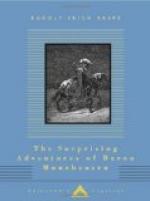Such is the history of the book during the first eight or constructive years of its existence, beyond which it is necessary to trace it, until at least we have touched upon the long-vexed question of its authorship.
Munchausen’s travels have in fact been ascribed to as many different hands as those of Odysseus. But (as in most other respects) it differs from the more ancient fabulous narrative in that its authorship has been the subject of but little controversy. Many people have entertained erroneous notions as to its authorship, which they have circulated with complete assurance; but they have not felt it incumbent upon them to support their own views or to combat those of other people. It has, moreover, been frequently stated with equal confidence and inaccuracy that the authorship has never been settled. An early and persistent version of the genesis of the travels was that they took their origin from the rivalry in fabulous tales of three accomplished students at Goettingen University, Buerger, Kaestner, and Lichtenberg; another ran that Gottfried August Buerger, the German poet and author of “Lenore,” had at a later stage of his career met Baron Munchausen in Pyrmont and taken down the stories from his own lips. Percy in his anecdotes attributes the Travels to a certain Mr. M. (Munchausen also began with an M.) who was imprisoned at Paris during the Reign of Terror. Southey in his “Omniana” conjectured, from the coincidences between two of the tales and two in a Portuguese periodical published in 1730, that the English fictions must have been derived from the Portuguese. William West the bookseller and numerous followers have stated that Munchausen owed its first origin to Bruce’s Travels, and was written for the purpose of burlesquing that unfairly treated work. Pierer boldly stated that it was a successful anonymous satire upon the English government of the day, while Meusel with equal temerity affirmed in his “Lexikon” that the book was a translation of the “well-known Munchausen lies” executed from a (non-existent) German original by Rudolph Erich Raspe. A writer in the Gentleman’s Magazine for 1856 calls the book the joint production of Buerger and Raspe.
Of all the conjectures, of which these are but a selection, the most accurate from a German point of view is that the book was the work of Buerger, who was the first to dress the Travels in a German garb, and was for a long time almost universally credited with the sole proprietorship. Buerger himself appears neither to have claimed nor disclaimed the distinction. There is, however, no doubt whatever that the book first appeared in English in 1785, and that Buerger’s German version did not see the light until 1786. The first German edition (though in reality printed at Goettingen) bore the imprint London, and was stated to be derived from an English source; but this was, reasonably enough, held to be merely a measure of precaution in case the actual Baron Munchausen (who was a well-known




